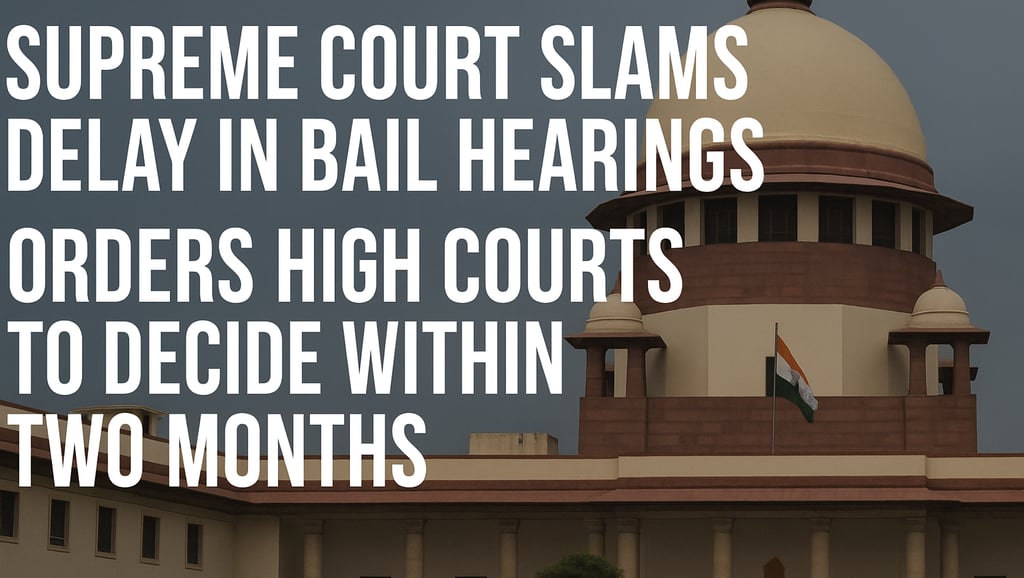Supreme Court Slams Delay In Bail Hearings: Orders High Courts To Decide Within Two Months
The Supreme Court’s landmark ruling on bail and anticipatory bail applications underscores the fundamental right to personal liberty. High Courts must now dispose of such cases within two months.
Adv. Nadeem Saifi | Partner | Altius Astra Attorneys
9/15/20252 min read


Why This Supreme Court Bail Ruling Matters For Every Citizen
Can you imagine waiting six long years just to hear whether you’ll get bail? For one set of accused in Maharashtra, this was a reality. But now, the Supreme Court has drawn a clear line in the sand: applications for bail and anticipatory bail cannot be kept pending indefinitely.
In a game-changing ruling in Anna Waman Bhalerao v. State of Maharashtra [2025 LiveLaw (SC) 901], the Court directed all High Courts and trial courts to ensure that bail applications are decided within two months of filing, except when the delay is caused by the parties themselves.
This isn’t just about legal procedure. It’s about the very right to personal liberty under Articles 14 and 21 of the Constitution of India.
The Court’s Strong Words On Liberty
A bench comprising Justice JB Pardiwala and Justice R Mahadevan minced no words:
“Applications concerning personal liberty cannot be kept pending for years.”
Keeping them undecided, the Court said, is akin to denial of justice.
The judges described the delay as allowing a “sword of Damocles” to hang over the heads of applicants.
The Court was especially critical of the Bombay High Court, which had left an anticipatory bail plea hanging for nearly six years before finally rejecting it. Even though the Supreme Court upheld the rejection, it reprimanded the High Court for the unreasonable delay.
Key Directions From The Supreme Court
The judgment didn’t stop at criticism—it laid down a clear roadmap:
Two-Month Deadline: Bail and anticipatory bail applications must be decided preferably within two months.
No Indefinite Adjournments: High Courts should issue administrative directions to trial courts to avoid dragging such cases.
Swift Investigations: Investigating agencies must conclude probes in long-pending matters without delay.
Special Mechanism: High Courts, as constitutional guardians, must create systems to prevent accumulation of pending bail applications.
The ruling has been circulated to all High Courts for immediate compliance.
Why This Ruling Is A Constitutional Wake-Up Call
India’s criminal justice system has long been criticized for its docket explosion—a flood of pending cases choking the courts. But when it comes to bail, the stakes are uniquely high. Liberty once lost cannot be restored easily.
Consider this: a young professional accused in a property dispute files for anticipatory bail. The case drags for years. Meanwhile, their career, reputation, and family life suffer irreparable damage—even if they are eventually found innocent. This is exactly the kind of injustice the Supreme Court wants to end.
As the Court rightly observed, bail decisions are usually straightforward, turning on the specific facts of each case. So why the delay? Administrative bottlenecks, overburdened judges, and lack of prioritization. This ruling cuts through that inertia.
Expert Take: A Step Towards Restoring Faith
Legal experts believe this directive could restore public faith in the justice system. By prioritizing matters of liberty, the courts reaffirm that the Constitution isn’t just lofty text but a living promise.
However, some lawyers caution that the two-month deadline may be difficult to achieve without judicial reforms and infrastructure upgrades. “Without more judges and better case management, the order risks becoming another well-meaning directive that courts struggle to follow,” one senior advocate remarked.
The Bigger Question: Will Liberty Finally Be Prioritized?
This ruling goes beyond one case—it’s a statement. The Supreme Court is telling the entire judiciary that personal liberty deserves urgency.
But will High Courts implement it in spirit, or will bureaucratic delays continue to shadow citizens’ freedom? That remains to be seen.
One thing is certain: the right to liberty in India has found a stronger defender in the Supreme Court.
Altius Astra Attorneys
A premier law firm based in Delhi, India, offering legal representation across various practice areas for citizens rights and interests.
© 2025. Altius Astra Attorneys. All rights reserved.
Contact Us
📞 9899290789, 9818786756
📧 contact@altiusastra.com
3C-ED Block, Madhuban Chowk, Pitampura, Delhi-110034
DISCLAIMER
